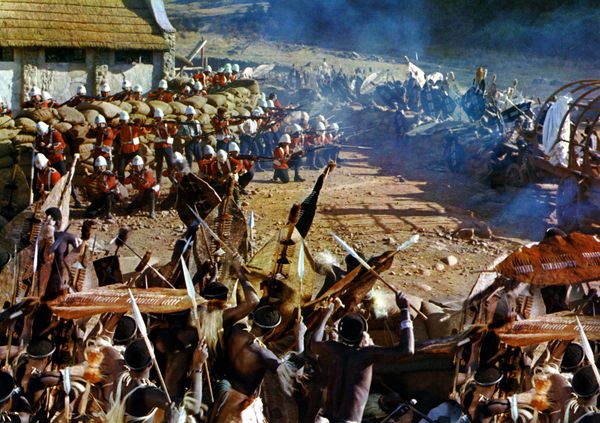Eye For Film >> Movies >> Zulu (1964) Film Review
Zulu
Reviewed by: Jennie Kermode

One of the most important war movies of all time, attracting rave reviews on its release, Zulu has now been relegated to the Sunday afternoon television slot; most people are familiar with its story, but younger people are unlikely to have given it a proper viewing. This is particularly unfortunate as its splendid cinematography deserves to be seen on the big screen. It's a film whose impact depends on its sense of scale, inspiring a sense of wonder at the scale of the forces involved. Because in the end this isn't just a film about one group of men fighting another. It's about a clash of civilisations.
Based on a true story (though its depiction of some real life characters is hotly contested), Zulu follows events at a small missionary station and supply depot called Rorke's Drift in Natal, just across the border from Zululand. As a despairing pastor struggles to establish peace, a battle breaks out at Isandlwana in which the British are roundly defeated. Rushing to the depot, the pastor and his daughter warn the troops who have a field hospital there and are working on building a bridge. From the outset, their situation is heavily symbolic. Doubtless they see themselves as an island of civilisation, developing facilities that will one day be of use to everyone in Africa - but in the process, of course, they are engineering a civil and cultural conquest which the Zulus know fine well may destroy their whole way of life and the independence of their people.

Focusing as it does on an engineering regiment rather than an army of conquest, the film is able to get away with a lot of direct exposition to fill in viewers about each side's resources and abilities, though it also provides an opportunity to leave certain things unexplained, such as the reason for the Zulu impis' superior physical abilities (their use of performance enhancing drugs would have been a controversial subject for a film at the time of release). This delivery is well handled and film sensibly takes its time to let us get to know the men and their relationships before plunging into the action. Knowing that there is no way they can outrun their enemy, the soldiers choose to stay and try to defend their tiny outpost. This would go on to become one of the most celebrated actions in British military history, with numerous awards made for bravery, but, stirring music aside, there is little focus on that here - rather than simple glorification we get a complex portrait of the embattled men's psychology. It's an approach that simultaneously acknowledges their courage and challenges its necessity, undermining familiar beliefs about war.
Parts of this film are so well handled that it's difficult to find any flaw in them at all. The performances are beautifully judged - including that of Michael Caine in his breakthrough role - and they succeed in engaging viewers despite the gulf in attitudes and expectations between 1879 and today. It's unfortunate that we don't get to see more of what's happening on the Zulu side, beyond a bit of commentary on their tactics, but this is perhaps necessary in order to maintain the sense of claustrophobia within the outpost - this is an ensemble film but we are expected to identify strongly with a particular group. The early battlefield tactics of the British are, quite frankly, an object lesson in what not to do in that situation, but there is plenty to admire in their resolve if not in their actions.
Where the film is weakest is in its depiction of the battle scenes themselves. Cy Endfield's skill is notable when it comes to landscape and interpersonal drama, but here he is out of his depth, and no amount of inventive camerawork can take away the sense that we are watching a game of tig where simply being touched by a spear or bayonet makes one fall over and die. Aiming to tell a story like this without gore is commendable, but the complete absence of blood in some scenes makes it hard to suspend disbelief. It's out of keeping with the studious realism of other aspects of the production.
On the cusp between two traditions in the making of the war movie, Zulu is interesting in that it develops a critical perspective that still leaves room for admiration of the soldiers involved - on both sides of the conflict. Whilst keeping its storyline simple, it effectively demonstrates how each side learns to respect the other, inviting viewers to do the same - and in the process proving far more challenging to the colonialist narrative than the more outwardly anti-Empire films that came later. Even as it presents us with a stage along the way to the further development of that Empire, it presages its downfall - the downfall of an idea that could no longer be sustained in the face of the human understanding made stark and inescapable on the battlefield.
Reviewed on: 13 Jun 2010
















